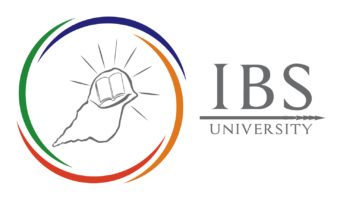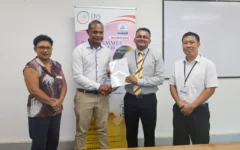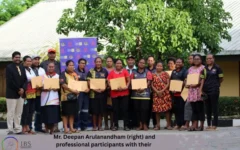Advocating Women’s Health & Wellbeing: IBSUniversity Commemorates Pinktober
November 10, 2025 2025-11-11 15:58Advocating Women’s Health & Wellbeing: IBSUniversity Commemorates Pinktober
IBSUniversity Campus, 11 Mile, Port Moresby, Friday, October 17th
In commemorating Pinktober and raising vital awareness about cancer, IBSUniversity hosted an insightful presentation on Breast Cancer, facilitated by Dr. Aina Anota from the Port Moresby General Hospital’s Oncology Department.
Dr. Anota’s presentation provided a clear definition, explaining that Breast Cancer is a condition where cells around the breast area change and begin to grow out of control. This uncontrolled growth can lead to the cancer invading nearby tissue and potentially spreading to other organs such as the lungs, liver, or spine.
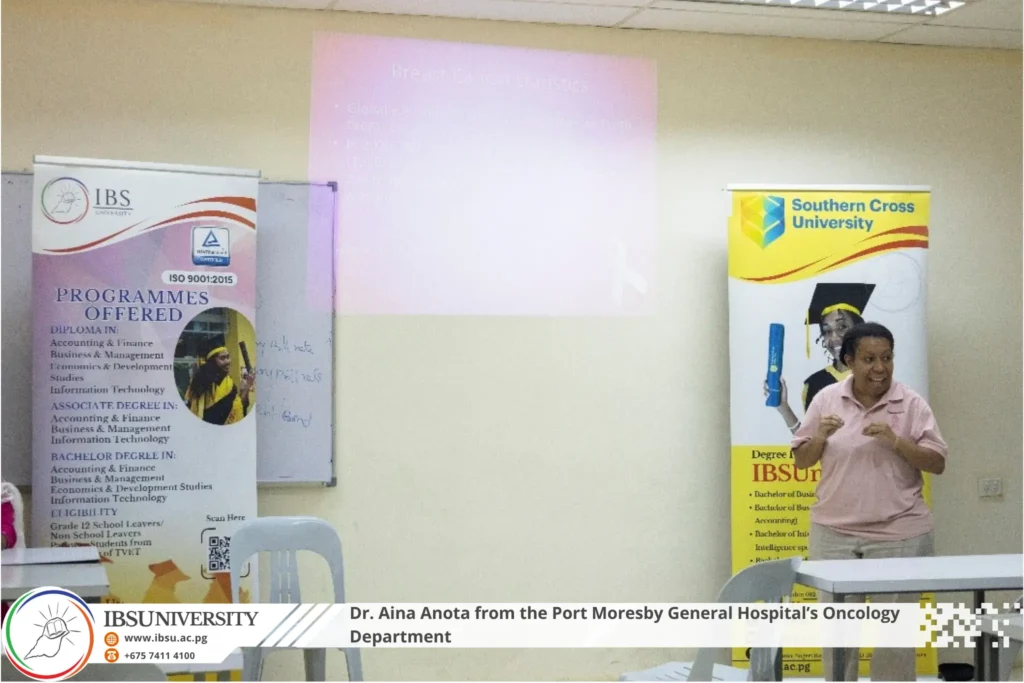
Globally, breast cancer presents a significant health challenge, with 2.3 million women diagnosed in 2020.
In Papua New Guinea, the impact of breast cancer is considerable. In 2020, breast cancer constituted 12.9% (1,570) of all new cancer cases reported in both males and females, and it made up 23.3% of all cancer cases seen in women.
Furthermore, data from the Port Moresby General Hospital (PMGH) Cancer Clinic indicates a concerning upward trend in new breast cancer cases. In 2022, out of 312 new cancer cases, 89 (16%) were Breast Cancer, with an average of 62 breast cancer patients seen per month. This rose in 2023, with 110 (33%) of 335 new cancer cases being Breast Cancer, seeing 68 patients per month. The first half of 2024 (January to June) shows the proportion increasing further, with 77 (43%) of 176 new cancer cases identified as Breast Cancer, translating to an average of 78 patients per month.
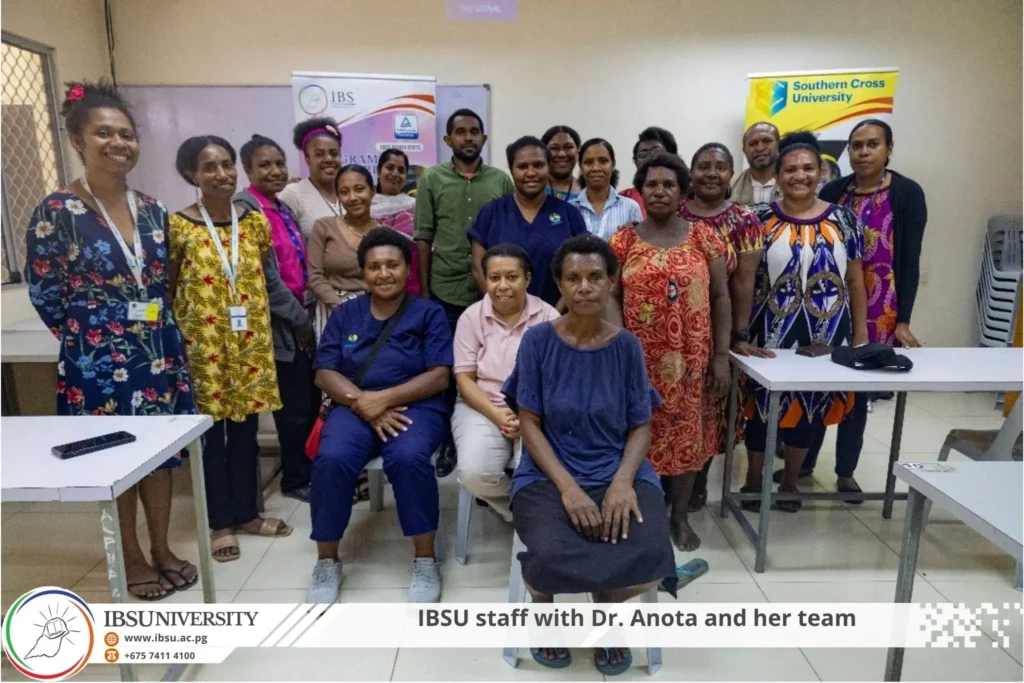
Dr. Anota stressed that it is critical to be vigilant and aware of potential symptoms and signs of breast cancer. Key signs include a breast lump or swelling, an inward turning of the nipple, and a specific form of breast swelling known as “Peu’de orange”. Other symptoms can include nipple discharge, a lump in the underarm area, swelling of part or all of the breast, skin dimpling, breast or nipple pain, and skin irritation.
She says early detection significantly improves outcomes. A crucial first step is the Breast Self-Examination (Self Check). Dr. Anota encouraged women and girls to regularly examine their breasts, using fingertips close together to gently probe in one of three patterns: radial, spiral, or vertical.
If a breast lump is detected, it is vital to seek immediate help at the nearest health facility. Local facilities mentioned include Susu Mama’s Clinic and the Cancer Clinic at PMGH, which offers breast screening every Friday.
Once a potential lump is identified, a healthcare provider may proceed with further diagnostic steps:
- A Mammogram is often used, particularly for women aged 40 years and older.
- An Ultrasound of the breast lump is performed.
- A Biopsy of the lump is taken for definitive diagnosis.
Dr. Anota said from observation, not a lot of women visit the Cancer Clinic for at PMGH, and it’s concerning, and she encouraged the attendees, especially women, to pursue voluntary check-ups in order to help detect early signs of cancer and give them a fighting chance should they show symptoms.
Continuing on in her presentation, Dr. Anota said once a cancer diagnosis is reached, treatment options typically include Surgical intervention and Chemotherapy. It was noted that Radiotherapy is not yet available in the country.
Adopting healthy lifestyle habits is paramount for Breast Cancer Prevention. These steps can help reduce risk:
- Diet and Weight: Controlling fat intake, losing weight to enhance the immune system, and eating more fruits and vegetables are highly encouraged, as they contain valuable vitamins and antioxidants, which are anti-cancer substances. Conversely, individuals should eat less animal foods, such as pork, beef, butter, and cheese.
- Substance Avoidance: It is crucial to avoid alcohol and drink less coffee =, as chocolate and coffee contain xanthine, which can promote breast hyperplasia and potentially induce breast cancer. Avoiding estrogen-containing drugs is also advised.
- Physical Activity: Engaging in reasonable exercise is a protective measure. Women of childbearing age who exercise 4 hours per week have been shown to reduce their chances of breast cancer by 60%.
- Mental Health: Maintaining good habits and a positive mindset is essential, as healthy living habits form the foundation of disease prevention.
- Breastfeeding: Breastfeeding is also listed as a way to reduce risk.
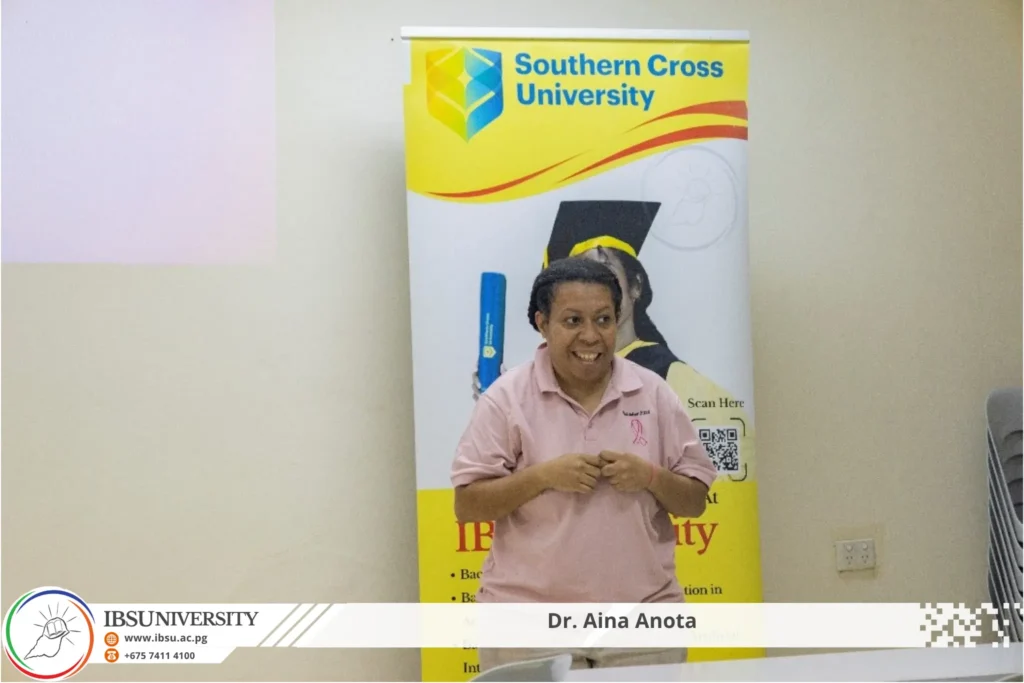
IBSUniversity’s Pinktober event serves as a powerful reminder that education and awareness are crucial. The final message of Dr. Anota’s presentation underscored a critical point for the community: No one should face Breast Cancer Alone.
For More Information Contact:
Dr Muthu Prabha Venkitachalam
Head of Student Affairs and Guidance counsellor
Email: muthuprabha.venkitachalam@ibs.ac.pg
Mobile: +675 7804 7125
Phone: +675 7411 4100 Ext.: 106
Content & PC: IBSU Social Media Officer – Edson Kuso
